Trending Now
We have updated our Privacy Policy and Terms of Use for Eurasia Group and its affiliates, including GZERO Media, to clarify the types of data we collect, how we collect it, how we use data and with whom we share data. By using our website you consent to our Terms and Conditions and Privacy Policy, including the transfer of your personal data to the United States from your country of residence, and our use of cookies described in our Cookie Policy.
{{ subpage.title }}
GZERO reveals the top 10 geopolitical game changers of 2024
2024 was a year of dramatic reversals. Some came at the ballot box, where long-ruling parties took a beating, anti-establishment figures stormed into power, or strongmen managed to see off what looked like fatal challenges. Some came on battlefields, where deadlocked conflicts began to break in one direction or another. And some came in how we think about politics and geopolitics more broadly.
This week, as we hurtle toward 2025, another year that promises to be pivotal in global affairs, we profile 10 people who, for better or worse, flipped the script, beat the odds, turned the tables, or otherwise changed the game in 2024.
GZERO's No. 10 2024 Game Changer: Italy’s Iron Lady
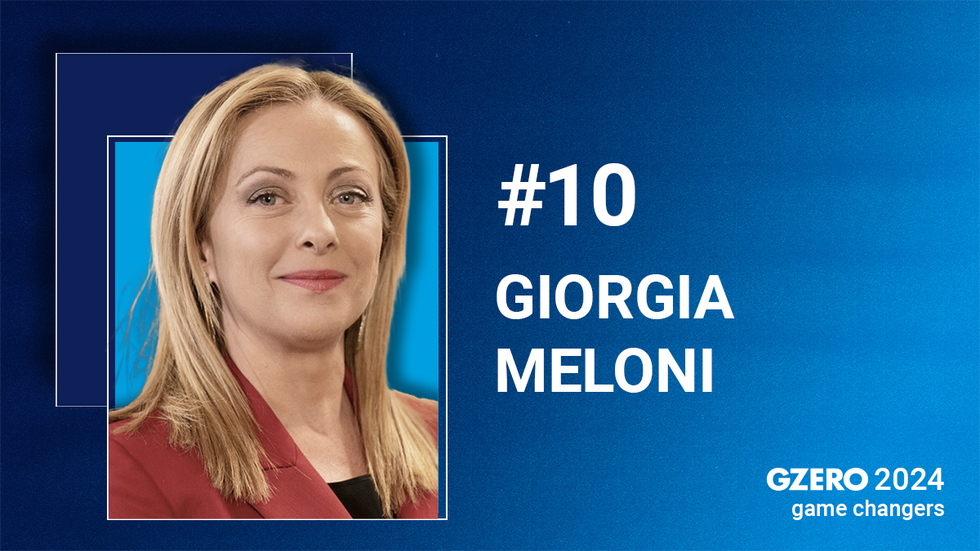
Who is she? Giorgia Meloni, 47, is Italy’s first female prime minister and the leader of the right-wing Fratelli d’Italia – Brothers of Italy – party. A staunch nationalist, Meloni rose to power in 2022, pledging to prioritize “God, family, and fatherland.” As a student, she was active in the neo-fascist Italian Social Movement before becoming Italy’s youngest-ever minister in Silvio Berlusconi’s government in 2008.
What did she accomplish in 2024? Meloni led her party to victory in Italy’s June elections, positioning herself as the “kingmaker” in the European Parliament. Her victory was due in part to her tough stance on migrants: Last year, Italy cut illegal immigration by 64%, inking agreements with Tunisia to reduce human smuggling and encouraging the EU to do the same with Egypt.
Meloni has faced pushback from Italian courts, however, on her plan to send migrants to Albanian processing centers. Herwide-ranging constitutional reforms to enhance executive power, including allowing the direct election of the prime minister, have also raised concern about potential shifts toward authoritarianism.
How has she changed the game? Meloni's migration crackdown found favor with other European leaders, including Hungarian President Viktor Orban. At the same time, she maintained strong support for Ukraine, recently authorizing Italy’s tenth military aid package for Kyiv. “Meloni has had a good year, and her fellow EU leaders in capitals and Brussels now hope she has been fully co-opted into the European mainstream,” said Mujtaba Rahman, Eurasia Group’s managing director for Europe.
What’s next for 2025? Meloni’s big domestic challenge is economic: Italy’s GDP is poised to grow by an anemic .5% in the coming year. Parliament passed several budget measures last week, including a one-off €100 Christmas bonus to 4.5 million disadvantaged families, and will continue allowing taxpayers to pre-pay their taxes for the next two years, regardless of how much they earn.
On the foreign policy front, Meloni may have an in with the incoming US administration in Elon Musk, with whom she famously traded compliments after he introduced her at the Atlantic Council’s Global Citizen Awards in October. However, Musk was subsequently seen to overstep when he criticized Italian judges who blocked deportations. And the two notably differ on future support for Ukraine. Time will tell whether Rome and Washington enjoy la bella vita – or not.
GZERO's No. 9 2024 Game Changer: Venezuela’s Strongman
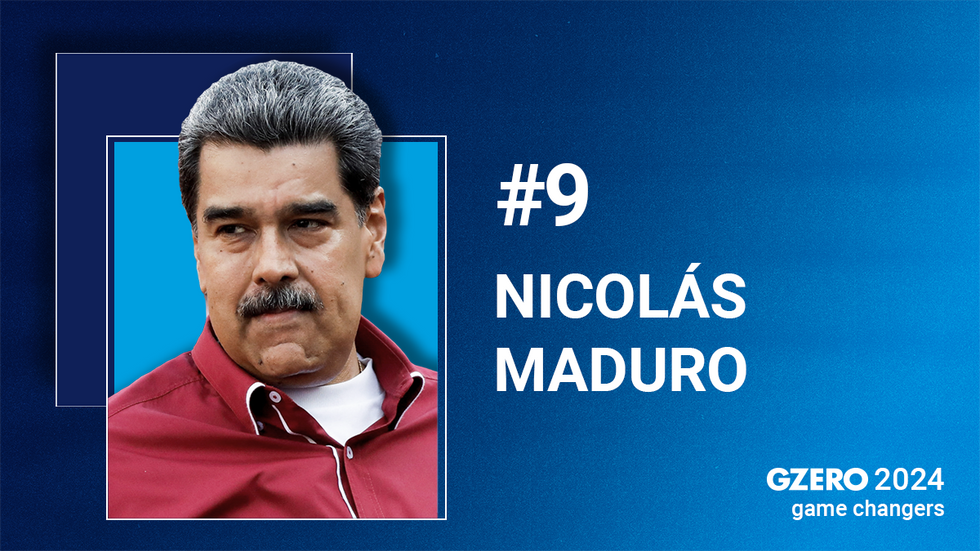
Who is he? Venezuela’s President Nicolás Maduro has been in power for 11 years, and over the past seven of those years, he has presided over one of the most spectacular social collapses in the world. Economic mismanagement, political repression, and tight US sanctions prompted more than seven million people to flee in a migrant exodus that has reverberated across the region, from South America to South Brooklyn.
What did he accomplish in 2024? Heading into the presidential election this past July, then, it seemed almost certain that the game was up for Maduro. His approval ratings were in the gutter. A historically splintered opposition had united behind a single, reasonably popular candidate. The polling was so skewed against him it seemed like he’d have to steal the election outright to stay in power.
And that’s what he did. Even as all available evidence – including thousands of voter rolls from across the country – suggested he had lost in a landslide, his government published figures showing that he had won a narrow victory. And since then, that has been that. Threats and enticements from the US have failed to budge Maduro. His police have cracked down ferociously on the opposition. He appears to be going nowhere.
How has he changed the game? Maduro has reset what looked like a losing game not only for himself but also for various outside powers that had hoped to see him gone.
What’s next for 2025? Perhaps the most interesting piece of this story will involve the US and the incoming Trump administration.
Trump has pledged to deport millions of undocumented migrants, and many of them are Venezuelan. Where will they go? Repatriation to their home country will require an agreement of some kind with Maduro.
Trump’s Secretary of State nominee, Sen. Marco Rubio, is a Cuban-American who is ultra-hawkish on the communist regime in Cuba as well as its “21st-century socialist” backers in Caracas. If Rubio had his druthers, both governments would be out of power, but he will now need to deal tactfully with Maduro, who has shown that he is, for better or worse, to be reckoned with rather than written off.
“While Trump’s team has hinted at space for a negotiation related to migrants,” says Eurasia Group's Latin America Director Risa Grais-Targow, “the president-elect’s specific history with Maduro, loyalty to Florida voters, and preference for US oil and gas production will limit the scope for a grand bargain and further sanctions relief.”
GZERO’s No. 8 2024 Game Changer: South Africa’s divisive populist
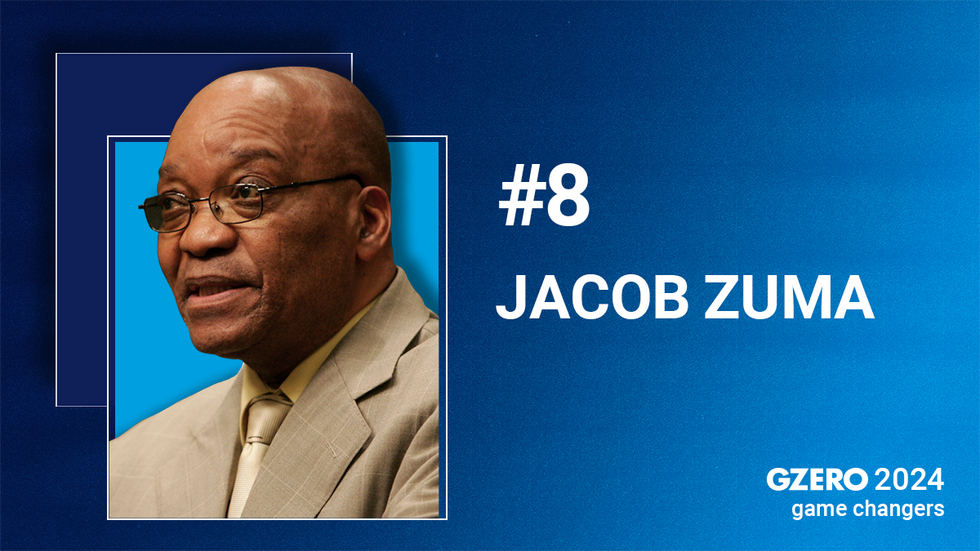
Who is he? It’s not often a former president continues to play a crucial role in the longer-term direction of his country’s politics, but Jacob Zuma is no ordinary former president. From 2009-2018, the charismatic Zuma led the African National Congress and served as South Africa’s president. A series of corruption allegations forced him from power, and Zuma felt he’d been betrayed by his deputy, Cyril Ramaphosa, who is now the ANC’s leader and South Africa’s president.
What did he accomplish in 2024? In 2024, three years after he served two months in prison on a corruption-related charge, Zuma came for his revenge. He formed a brand new political party — uMkhonto we Sizwe, or MK — and ran again for president. The new party didn’t come close to winning nationally, but by drawing 45% support in Zuma’s home region, KwaZulu-Natal, he helped strip the ANC of its national majority.
How has he changed the game? The ANC, Nelson Mandela’s party, the political embodiment of liberation from apartheid, saw its national vote share fall from 57% in 2019 to just 40% in 2024. That stunning result then forced the ANC to invite the largest opposition party, the Democratic Alliance, to form a government of national unity. This is the first time the ANC has had to share national political power since the end of apartheid more than three decades ago.
Zuma’s ambitions were not the only factor that pushed down the ANC’s vote share so sharply. South Africa is still plagued with high unemployment, inflation, corruption, crumbling infrastructure, and a lack of economic opportunity for young people. But, according to Eurasia Group Africa expert Ziyanda Stuurman, “there is a direct line between Zuma’s political maneuvers [in 2024], and the emergence of a coalition government few people would have ever thought was possible.”
What’s next for 2025? It’s too early to say whether forcing the ANC to work with the opposition DA will prove positive or negative for South African politics, but it’s clear that Jacob Zuma changed the political game this year in his country. His challenges to Ramaphosa’s government will continue into 2025.GZERO’s No. 7 2024 Game Changer: Citizens who said ‘No’ to status quo
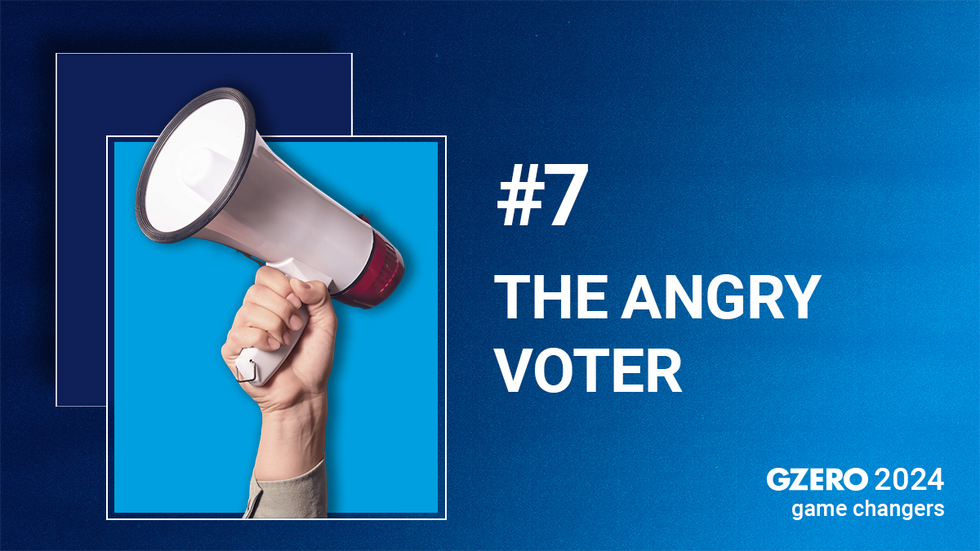
Who are they? Voters went to the polls this year in more than 50 countries with a combined population of more than 3.5 billion. A lot of them had strong messages to send their elected leaders.
What did they accomplish in 2024? In June, voters in India stunned outside observers by stripping the still-popular Prime Minister Narendra Modi’s Bharatiya Janata Party of its majority in parliament. The result forced the BJP to turn to fickle allies to pass more of Modi’s reform agenda and limited his room for maneuver.
Also in June, voters in South Africa made history by depriving the African National Congress of its majority for the first time in the country’s post-apartheid history. With just 40% of the vote, the ANC was forced to invite the opposition Democratic Alliance to form a unity government — one that has held together contrary to expectations, it must be said.
In July, voters in France punished their centrist President Emmanuel Macron by casting ballots for enough far-left and far-right parties to gut the political center. After struggling to form a government to advance state spending reforms, left- and right-wing parties came together to force Michel Barnier, a compromise choice for PM, out of his job. France’s political crisis continues.
Also in July, fed-up voters in the UK ended 14 years of rule by the Conservative Party in favor of Labour, led by new Prime Minister Sir Keir Starmer. The Conservatives' share of parliamentary seats fell from 252 to just 121, in part because Nigel Farage’s new Reform UK party drew much of the Tories’ support. And British politics has only become more combative. A November poll found that the percentage of UK adults with an unfavorable view of Starmer’s work as PM outnumbers those who approve by well over two to one.
In October, a shock election result in Japan cost the Liberal Democratic Party its majority in the Diet, the country’s legislature. The LDP has held power almost continuously for nearly 70 years.
In November, Donald Trump carried all the so-called swing states in a victory that will replace President Joe Biden and Vice President Kamala Harris with a Republican Party administration.
“Unemployment hurts a small number of people a lot, but inflation irritates everyone,” notes Eurasia Group’s Vice Chairman Gerald Butts. “Incumbents are discovering that hurting all of the people even some of the time makes the whole country angry at their government.”
GZERO’s No. 6 2024 Game Changer: Russia’s ruthless leader
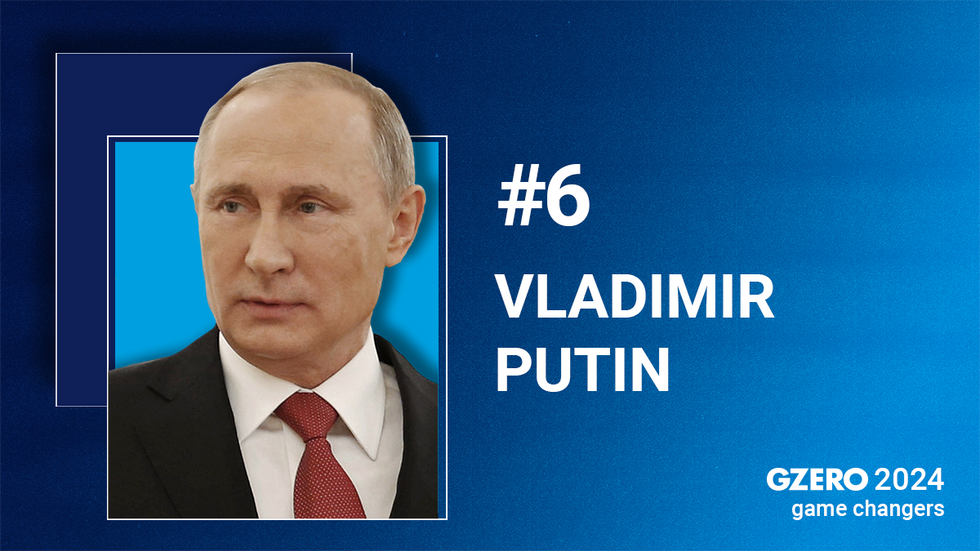
Who is he? Vladimir Putin, the ex-KGB agent who has ruled Russia without interruption since the turn of the millennium, hardly needs an introduction – you know the name. But even after nearly a quarter century in power, he continues to flip scripts year in and year out, and 2024 was no different.
What did he accomplish in 2024? As recently as a year ago, Ukraine and its Western backers still held out hope that Kyiv’s forces might push back the Russian invaders who have laid waste to so much of the country since the 2022 invasion. Since then, Putin has – slowly, cynically, but successfully – shown otherwise.
Today, Russian forces are grinding their way westward in the Donbas while Ukraine suffers shortages of manpower. Kyiv’s bid to divert Russian attention from Eastern Ukraine by invading a small corner of Russia itself in August hasn’t worked out – Putin didn’t take the bait, instead calling in North Korean troops to help repel the Ukrainian incursion.
Meanwhile, US President-elect Donald Trump has questioned support for Ukraine and pledged to end the war “in 24 hours.”
How has he changed the game? By altering perceptions of what’s possible. “In 2025, Ukrainian society will be reassessing their all-or-nothing view of victory,” says Tim Mak, editor of “The Counteroffensive” in Kyiv. “As a democratic country, Ukrainians are increasingly expressing a willingness to negotiate -- and a fear that continuing the war could lead to frontline disaster due to manpower shortages.”
What’s next for 2025? Not everything is roses for Putin these days. His heavily sanctioned economy grows only because of massive military spending. Inflation is high. The population continues to shrink, as birth rates are low and hundreds of thousands of talented young people have left in opposition to the war. Russian casualties in Ukraine now dwarf those of the late Soviet Union in Afghanistan. Globally, Moscow is increasingly the junior partner to a rising China, and the Kremlin just lost Syria, its most important ally in the Middle East.
But heading into 2025, Putin has set himself up to negotiate over Ukraine, and potentially over other issues, from a position of greater strength than many had believed, or hoped, just a year ago.
Honorable Mention: Kim Jong Un
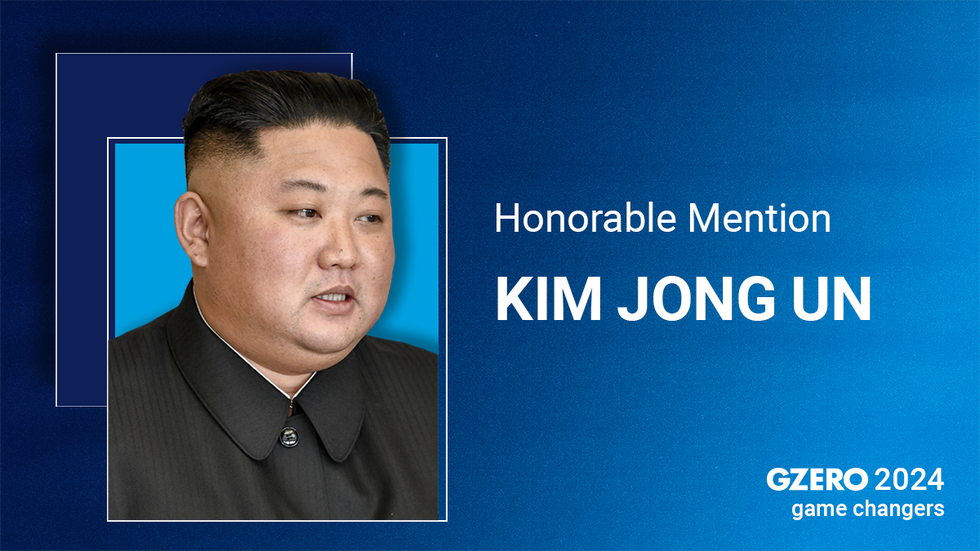
Who is he? Kim Jong Un, the 40-year-old Supreme Leader of North Korea, has been at the helm of the Hermit Kingdom since his father, Kim Jong Il, died in 2011. Following a ruthless consolidation of power, he has directed his energy and the state’s meager finances toward expanding the country’s nuclear weapons program, which he sees as central to North Korean security and sovereignty.
What did he accomplish in 2024? He concluded a mutual defense treaty with Russia while hosting President Vladimir Putin in Pyongyang in June — the first visit to the city by a Russian leader in a quarter century — that laid the groundwork for his deployment of troops to fight in Ukrainian-occupied areas of Russia. The deployment is a major escalation compared to the weapons aid he has been supplying Moscow since 2023, though thus far he has acted with total impunity. That treaty also opened much deeper cooperation with Russia to advance North Korea’s military technology, including progress on nuclear-powered submarines and a more powerful ballistic missile as well as attempts to launch spy satellites.
Kim radically overhauled his government's policy toward South Korea. In January, he renounced the goal of reunification with the South, officially removing it from the constitution. He also rather theatrically destroyed road and rail links to the south, constructed during a period of rapprochement at the turn of the 21st century.
How has he changed the game? By changing the terms on which it’s played. “The dramatic deepening of North Korea-Russia diplomatic and security ties in 2024,” says Eurasia Group expert Jeremy Chan, “has given Pyongyang more strategic optionality and greater assurance that neither South Korea nor the US will attempt an invasion.”
Seoul and Washington can’t credibly threaten military action without running unacceptable risks, and Kim’s control over domestic affairs still appears iron-clad. What’s more, by deepening relations with Moscow, Kim puts pressure on his frenemies in Beijing, who have few tools at their disposal in the relationship besides accommodation.
What’s next for 2025? If Kim has his druthers, talks with Donald Trump to secure recognition of his nuclear status. “These various nuclear and defense-related capabilities attained in 2024 will provide Kim with leverage in future negotiations with Trump,” says Chan, “while allowing Pyongyang to retain its hard-won nuclear deterrent, something which Kim has vowed will never be bargained away.”
Couple that with political chaos in the South after Yoon Suk Yeol’s attempted coup in early December, and it’s looking like the peninsula is in for a wild ride next year.
GZERO’s No. 5 2024 Game Changer: The Syrian rebel who reshaped the region
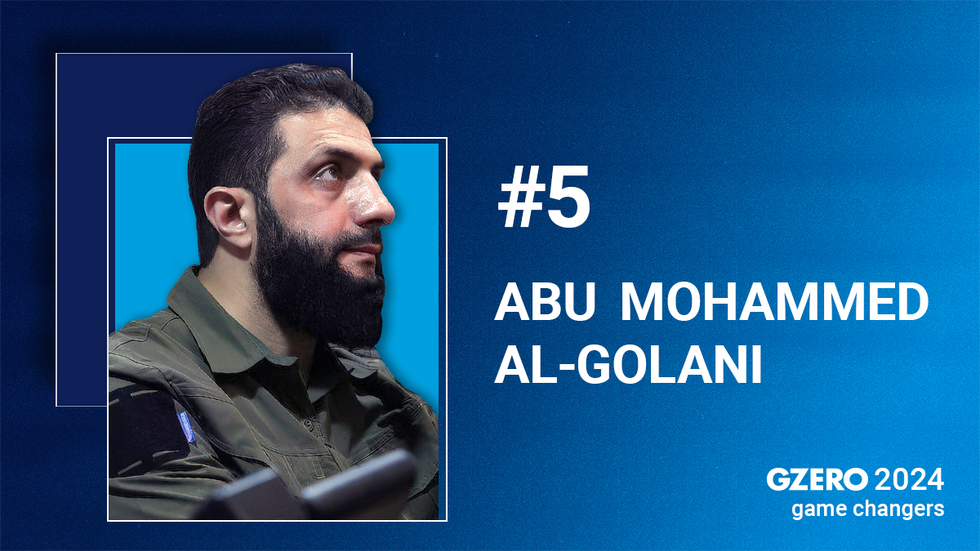
Who is he? The 42-year-old leader of the Syrian jihadist group Hayat Tahrir al-Sham, or HTS, al-Golani, born Ahmed Hussein Al-Shara, grew up in a middle-class Syrian family. He went to Iraq in 2003 to fight with al-Qaida against the US occupation, taking his nom de guerre “al-Golani” to honor relatives displaced from the Golan Heights, an area of Syria that Israel has occupied since 1967.
After the Syrian civil war began in 2011, al-Golani founded the anti-Assad jihadist Nusra Front group, which later rebranded as HTS.
In recent years, as he established control over northwestern Syria, al-Golani has sought to distance himself from global jihad and present himself as a statesman interested in stabilizing Syria.
What did he accomplish in 2024? In early December, HTS led a military campaign that surged across the country, capturing key cities within days. When the Syrian regime’s longtime backers in Russia and Iran failed to send more support to Bashar Assad, the game was up. In little more than a week, al-Golani’s forces had toppled the 54-year-old House of Assad.
How has he changed the game? The collapse of the famously despotic Assad regime has sent shockwaves through the region. Syria, for decades a bulwark of expanding regional power for Shia Iran, as well as Russia, is now under the nominal control of HTS, a Sunni group with links to Turkey, a country politically at odds with most major Arab powers. Israel is watching warily and has already struck at Syrian arms depots to prevent them from falling into the hands of anti-Zionist groups. Donald Trump wants the US to “stay out of it,” but he’ll inherit the nearly 1,000 US troops in Syria fighting Islamic State remnants. Iran and Russia, for their part, can hardly be expected to simply fade away.
What’s next for 2025? Al-Golani’s rule is barely a week old. He must establish order in a fractious country wrecked by more than a decade of brutal civil war. Can he? And will his vision of Syria allow the country’s sectarian minorities to live in peace and dignity? Is there a world where the 7 million Syrian refugees who have gone to Turkey and Europe since 2011 really choose to return?
In some ways, “the collapse of the Assad regime is the Middle East’s most hopeful moment in over a decade,” says Firas Maksad, a senior fellow at the Middle East Institute in Washington, DC. “But it carries within it the seeds of further communal and regional conflicts that could persist for a decade to come.”
What we know for sure is that al-Golani’s forces have already smashed decades-old assumptions about the balance of geopolitical, regional, and sectarian power in a volatile region. Whatever comes next begins now.
GZERO’s No. 4 2024 Game Changer: Israel’s political survivor

Who is he? Israel’s longest-serving prime minister, Benjamin Netanyahu leads the right-wing Likud Party. He was the first Israeli prime minister elected by direct popular vote in 1996 and served until 1999. He regained the premiership from 2009 to 2021, and then again in November 2022. His latest administration has been marked by the Oct. 7, 2023 attack by Hamas, mistreatment of Palestinian groups, limiting the Supreme Court’s power, and his own legal challenges, including charges of bribery and fraud.
What did he accomplish in 2024? Netanyahu has, as he promised in the wake of Oct. 7, reshaped the balance of power in the Middle East.
He has greatly weakened Israel’s adversaries, Hezbollah and Hamas, eliminating Hamas leader Yahya Sinwar and Hezbollah chief Hassan Nasrallah. Israel used the fall of Syria’s Assad regime as an opportunity to take control of areas in Syria beyond the Golan Heights and take out its neighbor’s military capabilities. Meanwhile, doubts about Israel’s deterrence abilities following Oct. 7 have been restored after it largely shot down all of Iran’s retaliatory missile strikes.
Eurasia Group’s Senior Analyst Greg Brew says Netanyahu’s greatest triumph was overseeing the war against Hezbollah, which decimated the group’s leadership, killed thousands of its fighters, and degraded its capacity to strike Israeli cities, without triggering serious retaliation.
How did he change the game? Netanyahu began 2024 with 85% of Israelis calling for his removal and officials circulating petitions calling him an “existential threat” to the country over his handling of the Gaza War. He is accused of abandoning the Oct. 7 hostages and prolonging the war for his own benefit.
"Netanyahu began 2024 still dealing with the aftershocks of October 7 - military, political and social - and a full-fledged offensive in Gaza," says Tel Aviv based journalist and advisor at Israel Policy Forum Neri Zilber. "The ensuing year saw him slowly grind down his opponents both domestic and foreign, following one overarching objective: playing for time and remaining in power. And it worked probably better than he could have ever expected."
He ignored US demands to treat Gazans humanely, calling Washington’s bluff over withholding military aid if Israel did not increase the flow of food and humanitarian aid. However, doing so has further alienated Israel on the global stage, leading global institutions, leaders, and human rights groups to accuse Netanyahu of committing genocide in Gaza.
Nevertheless, he is ending the year with a 47% approval rating, seeing his popularity rebound after his aggressive campaign against Hezbollah and Iran. “Netanyahu is looking much stronger than he was six months ago,” says Brew. “The war against Hezbollah, the strikes on Iran, and the decimation of Hamas has strengthened his claim to be the strongest figure ensuring Israel’s security.”
While centrist figures like Yoav Gallant and Benny Gantz have departed his cabinet, forcing Netanyahu to rely more heavily on far-right figures, “he has kept his coalition together and looks likely to do so in 2025,” explains Brew.
What to expect from him in 2025? The coming year will open up various possibilities for Netanyahu. "He has the option of simply holding on to power and continuing the grinding low-level war in Gaza; he can opt to cut a deal for the hostages in Gaza, even at the cost of halting the war, and use it as leverage for a larger peace deal with Saudi Arabia," predicts Zilber.
In the year ahead, Netanyahu is likely to benefit from and be emboldened by the Trump administration. Donald Trump shares Israel’s hatred of Iran, supports the Gaza War ending on Israel's terms, and has appointed Mike Huckabee, who is vocally in support of Israeli settlements in the West Bank, as the ambassador to Israel. Netanyahu's dependence on far-right figures like Itamar Ben-Gvir and Bezalel Smotrich will constrain his options when it comes to normalizing relations with Arab states like Saudi Arabia — something Brew says is certain to be a US priority under Trump.
But with US support all but guaranteed and public sentiment back behind him, Netanyahu is likely to continue his aggressive maneuvers in the Middle East into 2025.
“Netanyahu’s foreign policy priority in 2025 will be addressing the threat posed by Iran, and specifically Iran's nuclear programs,” says Brew. “I expect this to be the focal point in his relationship with Trump, along with issues of importance to his coalition, such as confirming US support for the settlement of territory — and perhaps even the partial annexation — of the West Bank.”
GZERO’s No. 3 2024 Game Changer: Those responsible for global migration
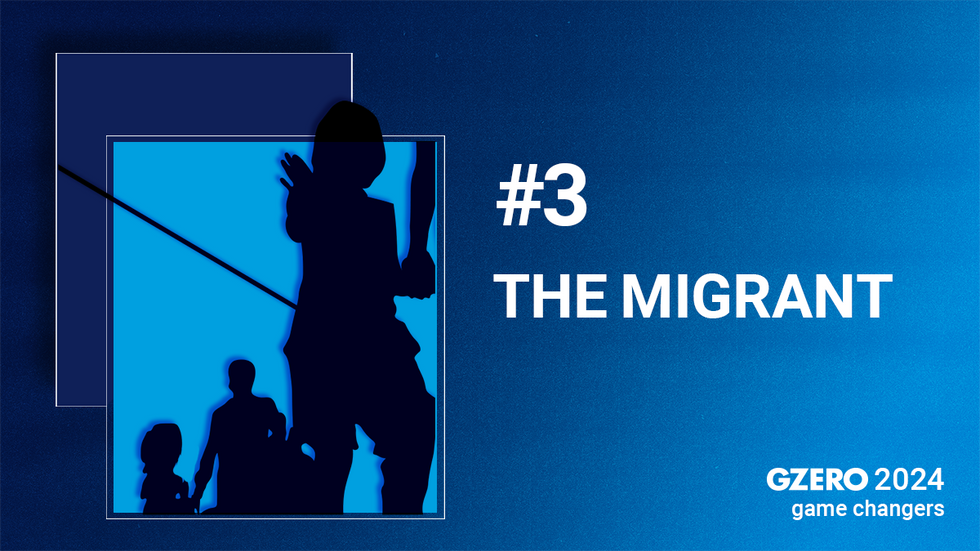
Who are they? The migrant took many forms in 2024, driven by armed conflicts, economic downturns, and the promise of opportunity – but their numbers fell as countries clamped down and closed borders. Irregular crossings of Middle Eastern and African migrants to Europe dropped by 42% in the first nine months of the year. Latin American migrants pursued better economic prospects in the US, but their numbers also declined sharply. Asian and South Asian emigres moved to Australia and Canada for education and jobs, but those countries also cut numbers back. In Africa, South Africa implemented a points system to prioritize skilled workers, while intra-continental migration surged in the North due to unrest in Sudan.
What did the migrant accomplish in 2024? Economically, migrants played a crucial role in labor markets, filling gaps in sectors like agriculture, healthcare, and technology. In some countries, their economic impact helped stave off a recession. But some migrant groups exacerbated social tensions, notably around issues that engaged their diasporas, such as the Israel-Hamas War, and also put a strain on cash-strapped public services.
And the latter issue caused a backlash among voters. “Since the pandemic, there has been a major increase in the number of immigrants, primarily legal ones, to Canada, the US, Europe, and the UK to address labor shortages,” said Graeme Thompson, senior analyst at Eurasia Group. “The problem is that first, those numbers increased very rapidly to historically unprecedented levels, and second, that has been combined with preexisting stresses on housing and social services. And that combination has proved politically explosive."
How did the migrant change the game? This past year, the migrant shaped elections around the world. Illegal immigration was the pivotal issue in the US presidential election, as now-President-elect Donald Trump accused the Democrats of failing to control America’s borders and blamed illegals for a surge in crime. In Europe, Austria's general election campaign was dominated by migration issues, with the far-right Freedom Party advocating for stringent asylum policies, while in Germany and Italy, anti-immigration parties saw a surge in support. Immigration was a key election issue in South Africa, where the ANC lost its majority as opposition parties pushed anti-migrant policies.
What to expect in 2025? The migrant will remain a source of tension as countries continue to clamp down on illegal immigration. Trump’s deportation plans could provoke a surge of migrants to Canada, prompting the Canadian government to announce a billion dollars in spending to harden its southern border. European countries, meanwhile, have stopped processing the claims of Syrian refugees in the wake of Bashar Assad’s overthrow, and many refugees plan to return home. But it remains to be seen whether the new regime will provoke a new exodus as minority groups such as the Kurds may feel under threat. The impact of immigration on housing has become a central issue in Canada and Australia, both set to have elections in 2025. And in Africa, the ongoing war in Sudan has displaced 11 million people and doesn’t look to end any time soon.
GZERO’s No. 2 2024 Game Changer: Billionaire entrepreneur
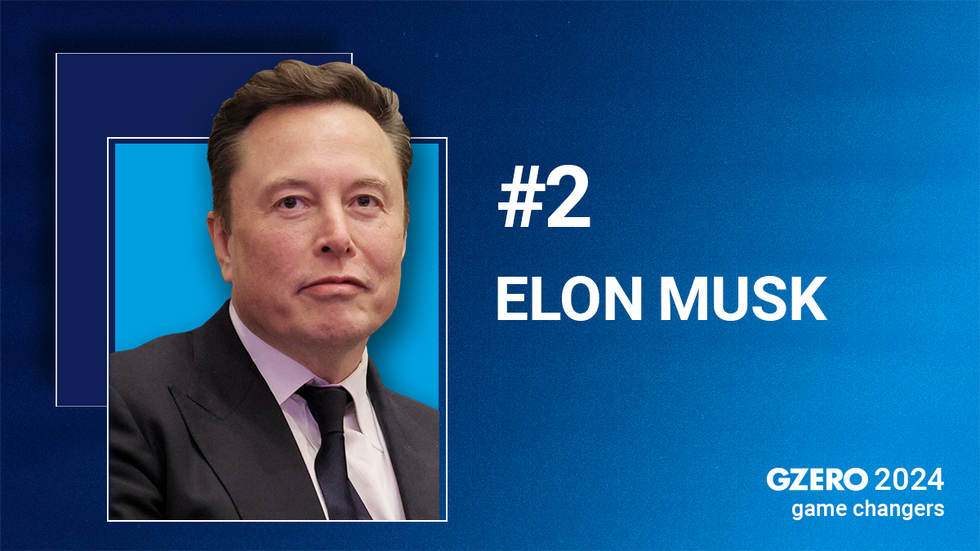
Who is he? The CEO of X, Tesla, and SpaceX, Elon Musk is the wealthiest and possibly the most powerful private citizen in the world. He controls a revolutionary space company, America’s top electric vehicle producer, and a big chunk of the global public square formerly known as Twitter. In 2025, he’s set to be the beneficiary of the biggest political bet of 2024: spending over $100 million in donations andleveraging his 200-plus million followers on X to support a Trump win for the American presidency.
What did he accomplish in 2024? In 2024, Musk became a political kingmaker. Musk’s financial and technological backing of the Trump campaign, including his use of AI-driven voter engagement tools,upended traditional election strategies. After Trump’s victory, Musk was appointed Director of Government Efficiency, or DOGE, a newly created position that will leverage private sector innovation to streamline federal operations. He even earned the praise of arch-lefty Sen. Bernie Sanders, who said “Elon Musk is right” to want to curb wasteful Pentagon spending.
How has he changed the game? Musk’s influence on politics and governance is unprecedented. By combining his tech empire with his growing political clout, Musk has blurred the lines between private enterprise and public policy. Musk has turned up on phone calls and meetings with global leaders (Ukraine’s Volodymyr Zelensky,Hungary’s Viktor Orban) and, closer to home, technology rivals (Google CEO Sundar Pichai).
What’s next for 2025? With DOGE, Musk plans to unveil a federal efficiency initiative targeting defense spending and bureaucratic red tape. While he’s not taking a salary, new programs could significantly benefit SpaceX, particularly in the area of military logistics and battlefield AI, raising questions of a conflict of interest. And Starlink’s satellites could replace Washington’s existing plans for hard-wired broadband infrastructure.
What does this mean for other companies seeking to do business with Washington – and for politicos seeking influence? “Getting on Elon’s good side has never been more important,” observes Eurasia Group President Ian Bremmer. “And for all the whispering in Trump circles that the White House won’t be big enough for their two personalities and wills, both men deserve credit for being extremely careful in managing relationships where their livelihood is at stake.”
GZERO’s No. 1 2024 Game Changer: MAGA in chief
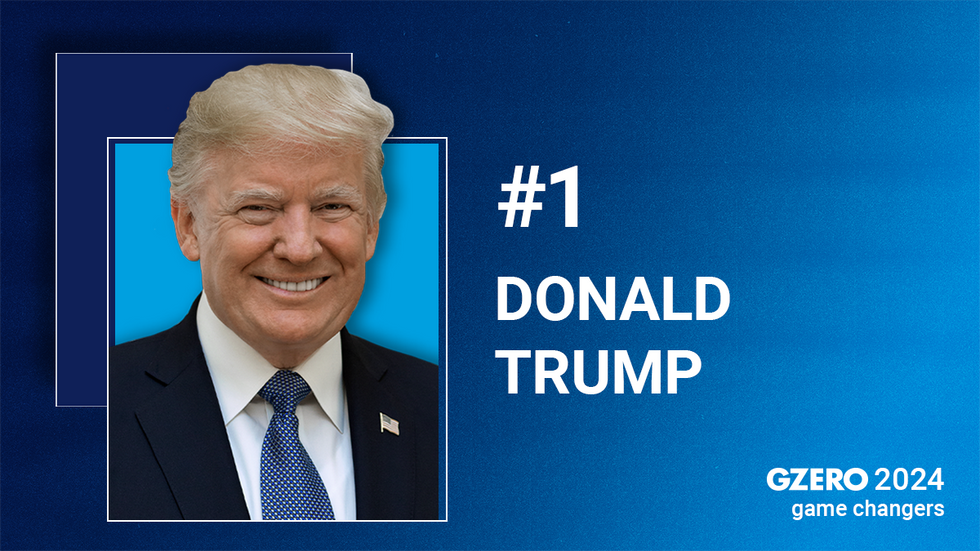
Who is he? At this point, Donald Trump – GZERO’s top political game changer of the year – needs no introduction. The New York native and real estate mogul began his political career in 2015, cementing it a year later by beating Hillary Clinton to win the presidency. But he was defeated by Joe Biden in 2020 in large part because of how he handled the COVID-19 pandemic, his harsh immigration policies, and his pattern of erratic behavior.
What did he accomplish in 2024? The former president turned president-elect is set to return to the White House after winning the electoral college and the popular vote in what was meant to be a close election. Trump is backed by a Republican-controlled Congress, a conservative majority on the Supreme Court, and a cabinet of loyalists determined to implement his policy agenda.
“Trump won the closest thing you can these days that counts as a mandate, and he’s the first Republican to win the popular vote since 2004,” says Eurasia Group’s US expert Noah Daponte-Smith. “That’s a big accomplishment, and it matters to the way he’s going to govern.”
How did he change the game? Trump’s win was no inevitability. Flash back to the Republican primaries, when he faced competition from Florida Gov. Ron DeSantis and former South Carolina Gov. Nikki Haley – until, that is, voters showed that the base remained squarely in Trump’s camp.
He prevailed despite facing 34 soon-to-be-obsolete felony convictions, the fallout from the Jan. 6 insurrection, and two states attempting to kick him off their primary ballots. In fact, in many ways, Trump used those setbacks to his advantage, spinning them to rally voters to the polls.
Trump won every swing state, accumulating the most electoral college votes for a Republican since 1988. He widened the party’s base, winning 2.5 million more votes than when he ran as the incumbent in 2020.
In doing so, he revealed the country had swung to the right, turned out a record number of young male voters, and made inroads with some Democrats – increasing his support among every demographic group besides women. He survived an assassination attempt against him and used it to further rally his party around him. The GOP is now Trump’s party, and any remaining old-school Republicans who may have opposed him have been left party-less – some even crossed the aisle to endorse Kamala Harris.
An underrated contributor to Trump’s victory was his “mastery of the new information ecosystem,” notes Daponte-Smith. “Trump’s podcast blitz in the middle of the campaign baffled many at the time but in retrospect looks to have been a deft move that enabled him to make substantial inroads among demographics that traditionally don’t lean Republican.”
What to expect from him in 2025. Even before his inauguration on Jan. 20, Trump is meeting with world leaders, compiling a cabinet of loyalists, and vowing to implement punishing tariffs on America’s allies and enemies.
In conflicts in Ukraine and the Middle East, Trump is likely to push for temporary ceasefires to demonstrate his peacemaking abilities, which may ultimately result in the partitioning of Ukraine and expanded Israeli power over Palestine. Meanwhile, he will likely restart his “maximum pressure” campaign to heavily sanction Iran.
Daponte-Smith says he is expecting Trump to make headway in three key areas: trade, taxes, and immigration. He will likely substantially raise tariffs on China in the first year while limiting illegal immigration to the US and ramping up deportations. “The tax bill at the end of the year, which will very likely extend all of the 2017 tax cuts, will be the cherry on top for Republicans, who know that trifectas tend to be short-lived and are looking to move quickly to make the most of this one.”
- 2023 game changers that weren’t ›
- Top 10 game changers of 2023 ›
- What Assad’s fall means for Syria, the Middle East, Moscow and Washington ›
- G7 meeting: Ukraine and Meloni take center stage ›
- Netanyahu's uncompromising UNGA address ›
- How will Trump 2.0 approach foreign policy? ›
- Elon Musk and the Political Power of Young Men ›
Venezuelan President Nicolas Maduro delivers a speech during a rally to celebrate the results of last month's presidential election, in Caracas, Venezuela August 28, 2024.
Venezuela arrests six in coup plot claim
Six foreign nationals, including three American, two Spanish, and one Czech citizen, were arrested in Venezuela on Saturday,accused of plotting to assassinate strongman President Nicolás Maduro. Interior Minister Diosdado Cabello announced the arrests on state television, claiming the suspects were part of a CIA-led plan to overthrow the government. One of the Americans is a US Navy SEAL identified as Wilbert Joseph Castañeda Gomez.
In response,the US State Department denied any involvement, called the claims “categorically false,” and reaffirmed support for a peaceful resolution to the crisis stemming from Venezuela’s recent elections. The Spanish Foreign Ministry said that the two Spanish citizens detained “do not form part of the Centre for National Intelligence or any state organization” and called for a “democratic and peaceful solution to the situation in Venezuela.”
The arrests cometwo days after the US Treasury imposed sanctions on 16 Maduro allies, and a week after Venezuelan opposition leader Edmundo Gonzales, who was facing arrest, fled to Spain. Washington refuses to recognize the results of Venezuela's July 28 election, in which Maduro claimed victory despite evidence that Gonzales was the real winner. Caracas called the US sanctions a “crime of aggression” that seeks to “overthrow, without success, the Bolivarian democracy.”Trump-Harris debate: What to expect
Ian Bremmer shares his insights on global politics this week on World In :60.
What issues will dominate the Trump/Harris debate?
Well, I mean clearly the economy, migration, abortion, I mean these are the issues that are on top of everybody's agenda. I care the most about global issues, foreign policy issues, things like climate change, artificial intelligence governance, and say, the Middle East, China, and Russia. But I suspect that that gets a small amount of time and also is a very little impact to voters that has still undecided. Having said all of that, I don't think this is mostly about issues. I think this is mostly about how does Harris perform against Trump and vice versa. And keep in mind that given just how filtered people's information sources are, if one of them wins by a little bit, then both sides are going to come away saying we destroyed the other, and so will all of their supporters.
So I mean, there has to be a big mistake or a big win for anyone to break through in what's an extremely tight race here. And that's what everyone's looking for, especially because Harris hasn't been tested like this before and Trump's last few public appearances have been pretty all over the map and showing his age. So I think people looking for first major test of Harris of this sort and is Trump capable of still delivering big-time entertainment in this sort of a format? So that's where we are. Everyone will be tuned in tonight. I think a lot more than 50 million people in the United States are going to be watching. This should be a highly, highly visible and important. Only two months before the election action.
As Edmundo Gonzalez seeks asylum in Spain, what lies ahead for Venezuela and Maduro's opposition?
Well, the fact that the United States has impounded one of Maduro's planes shows just how much that policy had failed, an effort to try to use carrots to get the Venezuelan government to be willing to hold a free and fair election. That was never going to happen. Not from the Americans, not from the Colombians, not from the Brazilians. Not from the Mexicans. There was no one out there that was going to make a difference. And sadly not Venezuela's opposition either. What this means is the military still supporting the Venezuelan president, massively corrupt, completely stolen illegitimate election and he's not going anywhere. That's where we are. And if Gonzalez hadn't fled the country, he was going to get arrested. Venezuelan military and president, very happy for him to flee the country. They gave him more than enough time and indication saying, "Okay, we're coming for you. We're coming for you. Okay, now we have an arrest warrant. If you don't leave, you're going to jail." He left. And everyone, I guess, is comfortable with that outcome, but a horrible place for the Venezuelan people, millions of whom will be streaming, millions more mostly to the United States, to Colombia, to other countries.
How was Mario Draghi's report on EU competitiveness received?
Received very well because the Europeans are not spending on competitiveness and industrial policy the way the Americans are, the way the Chinese are. And that means that they're being left behind in terms of technology. They're also not spending enough on security, which means they're still super, super dependent on the United States. And Draghi is calling for the Europeans to do a lot more, but they don't have the internal leadership to make that happen, and they don't have the fiscal space, nor do they have the coordination capable, even in a strong European Union. So very welcome. Not going to get implemented. That's where we are. Love Draghi, but he ain't running the EU.
- Harris’ first interview recap: She’s pragmatic, not progressive ›
- Ian Explains: What is Kamala Harris' foreign policy? ›
- Muted mics, amplified impact: Harris and Trump debate for razor-thin margins ›
- GZERO presidential debate scorecard: Rate the debate! ›
- Debate Bingo: Kamala Harris v. Donald Trump ›
- Harris wins debate - GZERO Media ›
Nicolas Maduro standing in front of protestors in Venezuela.
Maduro won’t go
Earlier this week, the US Justice Department seized the airplane used by Venezuelan strongman Nicolás Maduro, his equivalent of Air Force One. It’s the latest signal that the Biden administration remains furious at Maduro for stealing another of his country’s elections — and that it needs some way of expressing that anger. Will this latest US move undermine Maduro’s hold on power? Don’t hold your breath.
Background: US presidents have tried for years to force Maduro, in power since 2013, to hold free and fair national elections in Venezuela. Maduro has refused because he knows he would lose any contest that isn’t rigged in his favor. In 2018’s presidential election, he manipulated the vote to a degree that made international headlines, and the US and more than 50 other countries recognized the president of the National Assembly, opposition leader Juan Guaidó, as the country’s rightful leader. It made no difference; Maduro pressed on and remained in power.
Under President Donald Trump in March 2020, the US Justice Department charged Maduro and 14 of his political allies with narco-terrorism, drug trafficking, and corruption in hopes of loosening his grip. No dice.
The Biden administration has tried a different approach. Ahead of this year’s presidential election in Venezuela, the US lifted some sanctions in hopes of persuading Maduro to change his mind — and of keeping US election-year gasoline prices down. This can charitably be called the triumph of hope over experience. In January, the US was forced to reimpose some previous sanctions after Maduro barred the country’s most popular opposition candidate, Maria Corina Machado, from running against him this year.
Machado then elevated a little-known official, Edmundo González, to run against Maduro in her place. The presidential election went ahead in July, and Maduro immediately declared victory … without releasing any voting data. Venezuela’s opposition has since published more than 80% of the information printed and collected from the country’s voting machines thus far to make the case that González soundly defeated Maduro. In response, just as he did with Guaidó in the past, Maduro now appears ready to arrest González, or at least to use the threat of arrest to force González to flee the country. To show just how much power he still commands, Maduro decreed this week that this year’s celebration of Christmas will begin on Oct. 1. Seriously.
The US and Venezuela’s neighbors, particularly Colombia, have a clear interest in restoring credibility to Venezuela’s politics, in part because both countries and the region have absorbed millions of refugees fleeing political repression or simply looking for brighter economic prospects than Venezuela’s basket-case, sanction-plagued economy can provide.
The US request that the Dominican Republic seize Maduro’s plane is just the latest example of ineffectual pressure. US Attorney General Merrick Garland has claimed the aircraft “was illegally purchased for $13 million through a shell company and smuggled out of the United States for use by Nicolás Maduro and his cronies.” A US official told CNN this week that Washington is “sending a clear message here that no one is above the law, no one is above the reach of US sanctions.”
Let’s cut the chase: Maduro will continue to resist any deal that pushes him from power. The US has reportedly offered him amnesty if he agrees to step down. Some in Congress want a return to the Trump administration’s tougher approach. A group of bipartisan lawmakers led by Sens. Jim Risch (R-ID), Rick Scott (R-FL), and Bill Cassidy (R-LA) appear ready to present the so-called “VALOR Act,” a bill co-sponsored by Democrats including Rep. Debbie Wasserman Schultz (D-FL) and Sen. Michael Bennet (D-CO). The bill would significantly ratchet up US sanctions against Venezuela.
Brazil, Colombia, and Mexico have also tried to pressure Maduro by calling for the release of detailed voter tallies and an election audit conducted by some institution other than Venezuela’s Supreme Court, which remains fully under Maduro’s thumb.
But the Venezuelan leader still has firm backing from the country’s military and security forces, which profit from his rule. They will also again become the target of sanctions, but they’ve weathered these storms before and have had plenty of time to prepare for one of this year’s least surprising storms. In fact, Maduro has responded to pressure from the US and other governments not by offering concessions but by arresting opposition leaders and restricting access in Venezuela to social media that can be used to organize protests.
To date, the Trump get-tough approach and the Biden engagement strategy have both failed, because the US is no better able to dislodge Maduro than they were to sweep away Cuba’s Fidel Castro. Maduro, like Castro, has friends in Beijing and Moscow ready to provide diplomatic cover and just enough cash to render US leverage useless. Until there is a revolt from within Maduro’s domestic alliance of backers, clients, and enablers, the strongman will remain strong.
A demonstrator is holding a banner during an antigovernment protest in Lisbon, Portugal, on August 4, 2024. Venezuelans in Lisbon are gathering in Praca do Comercio to protest and express their disagreement with the election results in Venezuela and to support opposition leader Maria Corina Machado and opposition candidate Edmundo Gonzalez.
Venezuela’s neighbors brace for a fresh exodus
A new poll shows more than 40% of Venezuela’s population — roughly 7 million people — might flee the country in the wake of strongman President Nicolás Maduro’s apparently successful bid to steal the July 28 election.
According to research by local pollster Meganalisis, nearly a million of those people are planning to leave by the end of the year. If that happens, it will exacerbate what is already the world’s worst external refugee crisis.
Since 2014, nearly 8 million Venezuelans have fled their country’s political and humanitarian chaos, surpassing the numbers from Ukraine (6 million) and Syria (5.5 million). Three million went to Colombia, and 1.5 million are in Peru. Brazil, Chile, Ecuador, Spain, and the US are home to half a million each.
Their arrival has stretched the capacity of governments and societies to absorb newcomers, especially during the difficult climb out of the pandemic. Anti-immigrant sentiment has grown across the region. As far away as New York City, Mayor Eric Adams says the presence of 150,000 refugees, many from Venezuela, would “destroy the city.”
Venezuela’s opposition – which won the election, according to independent counts – is still in the streets, demanding a transition of power. But with Maduro now doubling down, millions may soon vote again – this time with their feet.
For more: Watch GZERO’s special report about the non-profits helping to welcome and resettle thousands of refugees amid New York City’s “broken” immigration system.
People carry Venezuela's national flag to protest the election results that awarded Venezuela's President Nicolas Maduro a third term, in Maracaibo, Venezuela, on July 30, 2024.
US declares Edmundo González rightful winner of Venezuela election
Based on exit polls from around 90% of the votes from last Sunday's election, opposition leaders say González beat Maduro by a large margin, and international pressure is building against Maduro. On Thursday, Brazil, Mexico, and Colombia called on Caracas to release detailed tallies of the vote, and the European Union has said it would not recognize Maduro’s claimed victory without independent certification of the election results.
Still, the US announcement is unlikely to change anything on the streets of Venezuela, where protesters have been demanding Maduro to accept defeat. Demonstrations, which have led to violent clashes with authorities and hundreds of arrests this week, are ongoing.
But Washington's move is likely to spur on the protesters. President Joe Biden, meanwhile, is mulling whether to reintroduce sanctions against Venezuela, despite it being a critical source of oil.Venezuela's President Nicolas Maduro speaks at the Supreme Court of Justice, in Caracas, Venezuela July 31, 2024.
Maduro offers “audit” of stolen election and threatens opposition with arrests
Protesters are marching in thestreets of Venezuela to demand that President Nicolas Maduro admit defeat in last Sunday’s election. Maduro claimed to have won by 51%, but the opposition says exit polls point to a strong win by their candidate, Edmundo Gonzalez. The US-based Carter Center, one of the few election-integrity watchdogs allowed to monitor the vote, agrees, noting that it “did not meet international standards of electoral integrity.”
On Wednesday, Maduro ordered the Supreme Court to conduct an audit of the election, which is a slight concession to cries for transparency, but he’s using an institution that is closely allied with his regime.
TheCarter Center added that the National Electoral Council, which formally proclaimed Maduro president for a third term through 2031 on Monday, demonstrated clear bias in his favor. It also pointed out that short voter registration deadlines and the exclusion of most of the country’s large diaspora (more than seven million Venezuelan citizens have fled during Maduro’s presidency) impacted the result.
The CNE has resisted showing precinct-level results, despite international calls for transparency. The regime is unlikely to produce adequate evidence to dispel doubts about the election, which will trigger more unrest – and will likely prompt the US to impose sanctions.
Still, Venezuela’smilitary has continued to back Maduro. Defense Minister General Vladimir Padrino has referred to the protests as a “coup in progress,” and Maduro’s regime has suggested that opposition leaders should be arrested. But Eurasia Group’s Latin America Director Risa Grais-Targow says that is unlikely because it would only prompt more social unrest and an even tougher international response.
A demonstrator reacts when Molotov cocktails hit the ground in front of security forces during protests against election results after Venezuela's President Nicolas Maduro claimed victory in Sunday's presidential election, in Puerto La Cruz, Venezuela.
Venezuelans take to the streets after Maduro claims victory
Thousands of Venezuelans descended on downtown Caracas Monday to protest strongman President Nicolás Maduro’s claimed victory in Sunday’s elections. Independent exit polls suggested that opposition candidate Edmundo González defeated Maduro — an authoritarian who has overseen economic decline in the oil-rich nation — by a sizable margin.
What began as isolated spontaneous outbursts around the capital turned into a major demonstration by the evening. Protesters chanted “They robbed us!” and waved a banner reading “Venezuela, I want you to be free” in Spanish while authorities responded with riot police, tear gas, armored cars, and paramilitaries with firearms. In the eastern city of Cumaná, protesters reportedly tried to reach the national election authority headquarters but were repulsed by National Guard troops.
International pressure: Opposition leader María Corina Machado, who was banned from running by Maduro’s government, said Tuesday that Maduro’s “departure is irreversible” after receiving exit polls from 71% of polling places, which she says proves the opposition won beyond all doubt.
Secretary of State Antony Blinken on Monday said the US had “serious concerns that the result announced does not reflect the will or the votes of the Venezuelan people,” and called on election officials to publicly release “detailed” vote tabulations. For the time being, however, Washington does not plan to revoke the oil export licenses that were meant to incentivize Maduro to hold a fair election.
Blinken’s sentiments were echoed by leaders from Chile, Uruguay, Peru, Panama, Costa Rica, Ecuador, Argentina, and Guatemala. By late Monday, Venezuela had expelled all diplomats from those countries, plus the Dominican Republic.
What we are watching: It will be surprising if the CNE releases “detailed polling data that dispels international doubts,” says Risa Grais-Targow, an expert on Venezuela at Eurasia Group, but without it, foreign pressure seems likely to grow.
Perhaps more importantly, the will of the opposition and the people to resist what they see as a stolen election will be determinative. We’re watching for protests to continue — and Maduro’s response to become more heavy-handed.
“The military continues to completely support Nicolás Maduro,” says Eurasia Group and GZERO Media president Ian Bremmer. “And that means the willingness and ability to use force to suppress and repress opposition is very high.”
For more on Venezuela’s stolen election, watch Ian’s latest Quick Take here.
